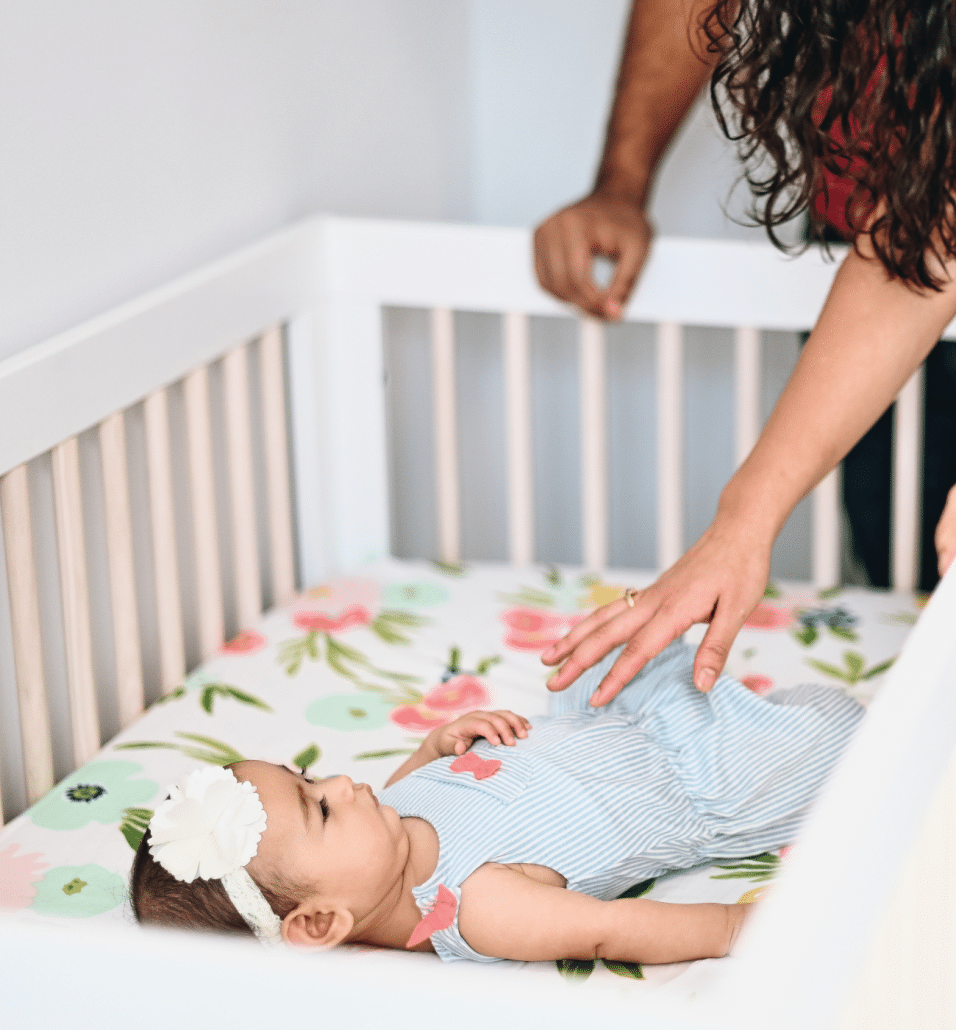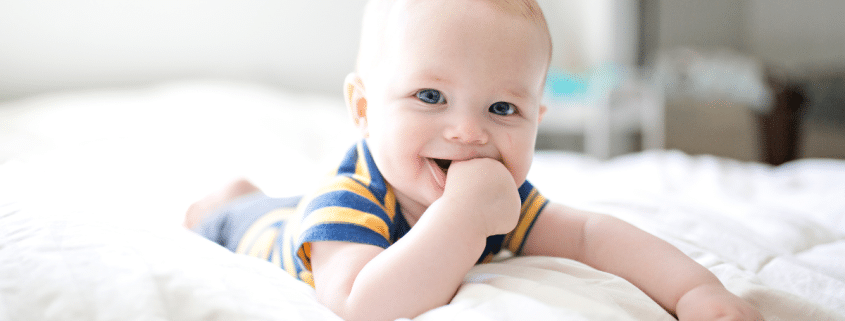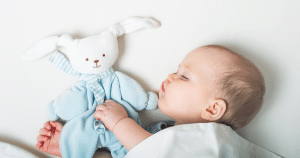4-Month Sleep Regression
When a baby goes through sleep regression, it can be particularly difficult for parents. If your child was previously sleeping well at around the 3 month mark, and you had the 3 month old wake windows all figured out, and it now feels like they have gone many steps backwards, it can make you feel defeated and discouraged. You can listen to our podcast on the creating the perfect bedtime routine for your baby here.
In this blog, we cover everything you need to know about the 4 month sleep regression, including tips to help combat it.
What are sleep regressions?
A sleep regression is a period of time when sleep goes off track or seems to go backwards and “regress” to a previous state.
For example, they may stop settling to sleep as easily as they could previously, they may wake up more often in the night and their naps can become shorter and prove more challenging. These sleep regressions are usually driven by your baby reaching a developmental milestone, which could be cognitive or physical.
This can be difficult for parents as it can be fantastic seeing your child reach those developmental milestones, but it can also impact the whole family’s sleep in return!
What is the 4 month sleep regression?

Your little one can go through several sleep “regressions” as they grow. The first sleep regression happens when your baby reaches 4 months old. Sleep cycles begin to lengthen and babies become more socially aware and can have growth spurts. At this stage babies start to make their own Melatonin (the sleep hormone.) They can also start rolling over.
There is A LOT going on for your baby physiologically and no, it won’t even be a gradual impact on your baby’s sleep. Suddenly, it can seem sleep in your household has been turned upside down. As a parent you may feel you are doing something wrong during this time, but let me reassure you a sleep regression is a biological change in your child and NOT something you need to prevent as it’s a completely natural process all little ones go through. So please don’t be hard on yourself. It is also worth remembering that some children are affected less than others when they are going through a sleep progression, so it’s worth trying not to worry too much and ride it out, whilst remaining kind to yourself.
What causes 4 month Sleep Regression?
So now let’s look at what causes such a big impact on your baby’s sleep. Sleep regressions are often caused by developmental milestones such as learning to sit up, crawl or walk. They can also be related to separation anxiety, teething and fear of the dark in older children. Learning to self-settle is a skill and as such your baby may be a little unsettled initially whilst they learn to do so.
Big life changes such as moving house, going to a childminder/different care giver or starting nursery, and a desire for independence in toddlers can also contribute to sleep patterns becoming disrupted.
What are the signs and symptoms of the 4 month sleep regression?
NIGHT WAKING AND SHORT NAPS

Frequent night waking, such as your baby crying in their sleep, and shorter naps can indicate a sleep regression. Night waking can be caused by several factors such as hunger, discomfort, illness, or sleep disturbances, while shorter naps may be down to a disruption in your child’s regular sleep patterns.
By being aware of these signs, you can offer reassurance and comfort to your child during sleep disruptions and make adjustments to their sleep environment or routine as needed. This can help minimize the impact of sleep regressions and support your child’s overall sleep.
FUSSINESS AND IRRITABILITY
Increased fussiness and irritability may be signs of a sleep regression. When a child experiences disrupted sleep, they may become more irritable and difficult to soothe. This can be challenging for both parents and children, as it can impact overall mood, behaviour, and general sleep quality.
SEPARATION ANXIETY AND CLINGINESS

Heightened separation anxiety and clinginess can also signal a sleep regression. As your child develops and grows, they may experience periods of increased anxiety related to separation from their caregiver. This can lead to sleep disruptions, as your child may have difficulty settling down for naps or bedtime without you being present.
During these periods, it’s essential to offer comfort, reassurance, and support to your child. By helping them to feel secure and supported, you can ease their anxiety and improve their sleep quality during sleep regressions. Try to refrain from adding in more sleep associations, as this will make getting things back on track more difficult.
Recognizing these signs and offering support, comfort, and reassurance means you can help your child navigate sleep regressions, whilst minimizing the impact on their overall well-being.
When does the 4 month sleep regression start?
Around 18-20 weeks old baby’s start to produce Melatonin (the sleep hormone) and start to sleep in cycles of around 45 minutes. The reason their naps start to become unsettled and night waking happens more frequently, is because they don’t know how to get themselves back to sleep. Self settling is a life skill. Imagine falling asleep in one place and then waking up somewhere completely different, it would probably feel very unsettling to you at first. So for a baby this has a big impact and they often will cry to get you to come back to them as they can’t yet communicate with language.
How long does it last?
Usually the 4 month sleep regression lasts between 2 and 6 weeks. In my experience, both with my own son and the client’s I work with, they are usually around 2-3 weeks long. If your child’s sleep has been negatively impacted for longer then it may be beneficial to access help to improve it.
When should I consult a doctor?
A sleep regression usually resolves after 6 or 7 weeks however, if you feel that something just isn’t right with your child because their sleep has been impacted for longer than this, then it is always worth speaking to your own GP. If your child has breathing problems at night for example you can be referred to a child respiratory specialist. Or if your child’s mood, concentration or well-being in general may have been impacted and they just don’t seem like them-self, then always trust your own intuition.
Is there a 6 month sleep regression?

Some children may start to develop separation anxiety earlier than 8 months old and this can impact their sleep. You may find once they move to their own bedroom this can heighten their anxiety initially, particularly if they have yet to develop the skill of being able to self-settle. Sometimes when a baby starts weaning at around 6-7 months old their sleep can seem to go off track. Again, this is another new set of skills and experience for little ones to discover, which can have a temporary effect on their sleep.
What are the common ages for a sleep regression?
4 months, 8 months, 12 months, 14 months, 18/19 months and 2 years old are common ages where sleep regressions are commonly experienced. At 4 months old your baby needs gentle encouragement and support to navigate their new sleep cycles and their night time sleep becomes more obviously pronounced. Naps start to fall into a more organised schedule.
By 8 months old babies gradually develop object permanence. (A child’s ability to know objects continue to exist even though they can no longer be seen or heard.) So when your baby can’t see you their separation anxiety can kick in. At 8 months old babies are moving towards transitioning from having 3 naps a day down to 2 naps a day and over-tiredness can become an issue, which can result in early waking and more frequent night waking.
The 12 month sleep regression is the least certain really. It is usually connected to a little one starting to walk. Some children try to pull themselves up to standing and want to cruise around their cot, meaning it can take a while for them to lie down and go to sleep.
The 18 month sleep regression can sometimes be delayed until 19 months. (That’s just sleep regressions for you! They aren’t always predictable.) It is also known as the toddler sleep regression. It is usually characterized by toddlers refusing naps in a bid to assert their autonomy, teething discomfort as molars come through and resisting bedtime. Hold firm to the boundaries you set but allow your child some choice from this age to fill up their independence tank, as children actually love routine, boundaries (as they help them feel secure when they know what is acceptable and what is not) and a sense of control over situations.
Life transitions such as potty training or moving to a toddler bed can have an impact on
sleep from 2 years old. From around 2.5-3 years old children’s imagination grows and can result in nightmares. To help your child through this temporary period try to maintain a consistent bedtime routine, be patient and offer comfort and reassurance whilst your toddler moves through these transitions.
If my baby is crying in their sleep could they be having a sleep regression?
Crying can sometimes be a sign your little one is moving from one sleep cycle into the next. Sleep cycles are made up of light “active” sleep and deeper sleep. The beginning and end of sleep cycles are active sleep, so it’s very common to see your child flinch, wriggle a bit, seem to be trying to talk and even cry or shout out. Over-tiredness can also cause some crying in sleep. Having your little one down for enough naps during the day, with the correct wake window (usually 3-4 long naps or 4-5 cat naps so they are asleep for 15-16 hours over a 24 hour period, usually with11-12 hours over night.) You are looking at a wake window of 1-1.5 hours at 4 months old, without your little one getting to tired and getting a “second wind” which is down to adrenaline keeping them going.
If my baby is fighting sleep could they be having a sleep regression?

Yes. When little one’s start to learn a new skill, like rolling over for example, their brain wants to just keep practicing and practicing and practicing! It’s a novelty to them and they can struggle to almost switch off from thinking about how to do the new thing they haven’t started to do. That being said, if your child is taking a while to fall asleep they could also be over or under tired, which is why knowing how much sleep your child needs it and for when can go a long way to making falling to sleep much easier for them. It is always worth keeping an eye on their sleep schedule and tweaking where necessary as they grow.
How do you recommend I handle a sleep regression?
Ensuring your little one is getting enough sleep in the day can go really far towards better sleep in the night. Look at their wake windows to check they are moving towards being spot on for their age at the time. By learning your own child’s sleep cues (some children show very subtle tiredness signs. Red skin around their eyebrows when young is a common one, eyes glazing over is another good early one to spot too) you will get to know when to put them down to sleep. Good daytime sleep correlates with language development, so by making the most of naps your little one’s communication skills will thrive. One of the best things you can do is to stick to a consistent bedtime routine.
Put Them Down Earlier
Try to get your little one down around 15 minutes before the end of their wake window to allow them time to start practicing falling to sleep in their sleep space from being fully awake, as this will be hugely beneficial in them being able to self-settle.
Create the Perfect Sleep Environment

Optimise the sleep environment for your child. Black-out blinds for all sleep will support the production of Melatonin in the brain and really help your child’s body to relax into sleep much easier. Make any lights you have on be either amber or red light, as white light and especially blue light hinder Melatonin production. If you choose to use white noise to block out external noise either inside or outside the house, have it playing for the duration of sleep. There are some good white noise apps and videos too on YouTube that will play for 12 hours at a time.
Let Your Baby Practice Their Skills
Allowing lots of practice of new skills in the daytime will go along way to reduce how long your child will want to practice during the night, allowing them to get the restorative sleep they need through the night.
Have a Consistent Bedtime Routine
A consistent bedtime routine is great to help your baby get settled to fall sleep for the night. An age appropriate schedule for your baby can involve: milk feed, bath, a baby massage, cuddling and then bed. It is important that you keep the bedtime routine consistent- making sure to put your baby to bed at around the same time each night.
Take Time for Yourself
Nap time is sacred time for you too as a busy parent. By supporting your child to have the best quality sleep and the right amount of sleep for their fast growing little body means they have a better immune system, grow as they should mentally and physically to set them up well in those first early years of their life and even go a long way to help support their emotional regulation. All of which means your family will be happier and healthier thanks to vital sleep. You need time to yourself, take that time and support whenever you need to, however that looks for you.
What are mybump2baby mums saying on this subject?
“The 4 month sleep regression was awful for us, we barely had any sleep if we did it was just a light sleep. Not all babies go through the 4 month sleep regression but ours did for a good few weeks. Baby sleep is difficult at the best of times but when you feel like you are getting somewhere and the bad sleep habits start it can feel like torture. We tried to sleep train a little to see if that made a difference but she was too young, our eldest did no night waking from 12 weeks he was down for the night in a deep sleep. We thought we had done everything for healthy habits sleep for our littlee girl but she would wake frequently, my husband works nights so all the sleep regressions were on me and getting a night sleep just wasnt possible for me for a good few weeks. It was tough!”
“The four month sleep regression was a very hard time for us as a family, we tried to create healthy sleep habits for our little boy but the sleep regression really took its toll on us all. The sleep cycle seemed to change as well as he sleep patterns. It all seemed to happen at the same time, he would fall asleep as normal but just as we started to relax for bed ourselves it would begin. I was trying to stay safe with sleep and not let my baby fall asleep in our bed but this was not easy at all. A few times i nearly fell asleep with him in the bed and it worried me”
As a parent and infant sleep consultant I believe quality sleep is an important foundation of health and happiness for everyone.
By supporting and optimising infant’s and children’s sleep through comforting and reassuring methods I strive to empower parents so they can rest easy, knowing they are doing their best to get vital sleep to help their family thrive.



















Leave a Reply
Want to join the discussion?Feel free to contribute!